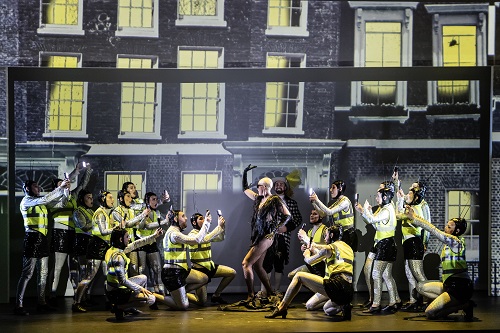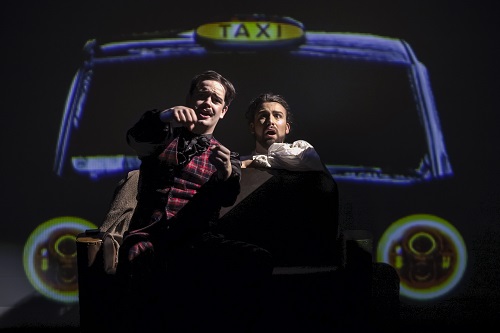Blessed by varied approaches to its staging and performance, The Rake’s Progress seems to remain eternally itself (whatever that might mean, as a sometime Prince of Wales might have put it). Not unlike Stravinsky’s evergreen score, the cleverer and in many respects the more involving the more one knows it, everything may seem to come from somewhere else, and in a sense it does; but equally, in another sense, it does not. It makes for great theatre, almost no matter what, and Royal Academy Opera certainly achieved that, as indeed it did when I reviewed an earlier production here by John Ramster, seven years ago.
This new incarnation, directed by Frederic Wake-Walker, relies heavily on eye-catching animation (Ergo Phizmiz) and images of present-day London from Downing Street to City towers to (presumably former) local authority buildings in their shadow. In one sense (yes, Janus-faced again), it was not always clear to me what it might all add up to. Another Rake placing London at its very heart, Simon McBurney’s as seen in Aix, for me penetrated deeper. For instance, with cardboard boxes—a very large one being Baba the Turk’s sedan chair—arriving alongside partygoers on Downing Street, I assumed we might have some sort of insight into more notorious parties still; yet instead, we headed somewhere else. The party had moved on—as, of course, so many Covid partygoers urged us to. Perhaps indeed that was the point, for earlier eighteenth-century costumes and Arcadia notwithstanding, this was a Rake for the age of Instagram, chorus members eager to snap pictures of Baba once she had emerged.

The odd thing was that Baba simply seemed to be a celebrity, with no evident reason for notoriety and certainly no beard: a sort of cross between Su Pollard and Lady Gaga. Again, perhaps that was the point. There were plenty of visual jokes, which kept a lively audience amused. And who is to say, after all, that one does not miss the point if one does not remain on the surface level? With boxes strewn across scenes, signs of transitory lives, and bubble wrap emerging ingeniously from them, that certainly did seem to be part, at least, of the point. The melancholy work of Bedlam inmates at the end, refashioning material that once had made up their party clothes, was an excellent touch.
Stravinsky points both ways, of course; so too, arguably, does Auden. Trevor Pinnock’s conducted a lively and generous account of the score, the Royal Academy Sinfonia sharp, pointed, yet far from inexpressive. Occasionally I missed greater numbers in the pit, but chamber forces had virtues of their own, not least in solo work, where reference to eighteenth-century music(s) in particular truly hit home. The orchestra contributed greatly to the gaiety of the occasion, but also to its poignancy, and not only in the final act. Lost moments of Cosi fan tutte, suspended in musical animation, made their fleeting point almost as strongly as the fatal games of the graveyard scene (for which special mention should go to the excellent harpsichordist Alexsander Ribeiro de Lara).The chorus, very much a collection of soloists, in gesture and musical line, who could yet come together as more than the sum of their parts, was not the least shining light of the evening’s entertainment.

Nor too were the young soloists, many of them doubtless heading towards careers in whatever remains of the opera business after our Downing Street masters and ‘Arts Council England’ have had their say. Like Stravinsky—Auden too—they may have to emigrate. Good luck to them, if so, if Brexit-Insel continues to treat them as seems likely. Ryan Vaughan Davies was a memorable Tom Rakewell, neglecting neither implied poignancy of situation nor irresistible allure of the moment. Whether one should sympathise or not is perhaps a moot point; it would, however, have been difficult to fail to do so.
Likewise, from other angles, the rest of the cast—who might, after all, on paper seem difficult to like, let alone to love. Cassandra Wright’s Anne combined cleanness and beauty of Mozartian line with the fleshed-out character of his heroines: a combination far from always achieved. Jacob Phillips’s dark and dangerous Nick Shadow involved us, like it or not. Hovhannes Karapetyan’s dark-voiced, seemingly generous-of-heart Father Trulove, Georgia Mae Ellis’s fun-loving yet formidable Mother Goose, and Rebecca Hart’s capricious yet, at the last, deeply human Baba the Turk all added novelty to their roles without departing unduly from what we (fancied we) already knew. Samuel Kibble’s lively Sellem and Duncan Stenhouse’s compassionate Keeper of the Madhouse rounded off a cast with no weak links and excellent interaction. Perhaps, indeed, that was the point.
Mark Berry
Igor Stravinsky: The Rake’s Progress
Tom Rakewell – Ryan Vaughan Davies, Anne Trulove – Cassandra Wright, Nick Shadow – Jacob Phillips, Father Trulove – Hovhannes Karapetyan, Sellem – Samuel Kibble, Baba the Turk – Rebecca Hart, Mother Goose – Georgia Mae Ellis, Keeper of the Madhouse – Duncan Stenhouse. Director – Frederic Wake-Walker, Conductor – Trevor Pinnock, Designer – Anna Jones, Lighting – Charlotte Burton, Collage, animation, AI image generation and illustration – Ergo Phizmiz, Illustration and animation – Lottie Bywater, Chorus, Royal Academy Sinfonia.
Susie Sainsbury Theatre, Royal Academy of Music, London; Thursday 24th November 2022.